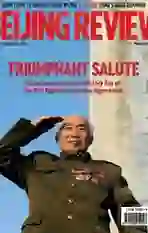Stuck in First Gear?
2014-09-23ByDengYaqing
By+Deng+Yaqing
Tianjin, a major industrial city along the western coast of Bohai Bay in north China, has become a new foothold for domestic automaker Hawtai Motor Groups business expansion. Before its production facilities in Tianjin went into operation on May 28, the company had already established manufacturing bases in Shandong Province, Jilin Province and Inner Mongolia Autonomous Region.
“Hawtai will make full use of the international shipping and logistics resources in Tianjin to export our cars to overseas markets,” Sinmo Zhang, Human Resource and Administration Manager of Hawtais Tianjin unit, told Beijing Review.
As a late starter in the auto market, Hawtai places more stock in overseas markets like Russia and Southeast Asian and Middle Eastern countries than the Chinese market. According to statistics from Hawtai, its sales in China in the first half of the year totaled a mere 16,000 units in stark contrast to the 50,000 units sold overseas, though it aims to sell 85,000 units in 2014 in the Chinese market.
Hawtai is not the only domestic automaker that has suffered a weak demand on the home front. According to statistics from Zhejiang Geely Holding Group, the private automaker sold 187,000 units in the first half of this year, down 29 percent year on year.
In addition, the China Association of Automobile Manufacturers (CAAM) reported, in the first half of the year, domestic brandsshare of the Chinese auto market fell 3.1 percent and the share for sedans 5.4 percent.
“Despite the geographical and cost advantages held by domestic automakers, they cannot compete with their foreign rivals for a slice of the Chinese market. In effect, domestic automakers are in the position of‘playing catch up and thus have to deal with pressures and overcome an array of challenges,” Zhang claimed.
Left behind
Since Chinese automakers started much later in the game than their overseas counterparts, they have been lagging behind in terms of technology, brand promotion and after-sales services, said Qiao Liang, an executive director of the Society of Automotive Engineers of China.
Jia Xinguang, managing director of the China Automobile Dealers Association, noted that since entering the World Trade Organization, foreign automakers and their joint ventures in China have wasted no time in grabbing the lions share of the Chinese auto market. Its almost impossible for domestic brands to turn around the situation given their respective weaknesses in technology, capital and popularity.endprint
